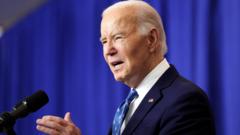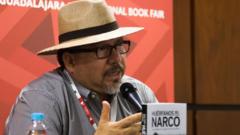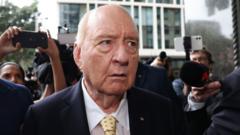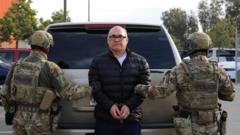Luigi Mangione, the alleged shooter of UnitedHealthcare CEO Brian Thompson, has entered a plea of not guilty in New York state court, confronting both state and federal charges that underline an intensifying narrative on healthcare discontent and societal implications of violent extremism.
Luigi Mangione Declares Innocence in CEO Murder Case Amidst Complex Charges
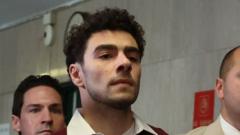
Luigi Mangione Declares Innocence in CEO Murder Case Amidst Complex Charges
Luigi Mangione pleads not guilty as he faces severe charges for the murder of a healthcare CEO, revealing deeper societal issues.
Luigi Mangione's recent arraignment marks a pivotal moment in a case that reflects escalating frustrations with the US healthcare system. The 26-year-old stands accused of murder and terrorism charges tied to the fatal shooting of healthcare executive Brian Thompson in Manhattan. Appearing in court in a maroon sweater and khakis, Mangione faces a litany of charges, including 11 state criminal counts that could result in life imprisonment without parole if convicted. Federal authorities have additionally levied stalking and murder charges, potentially exposing him to the death penalty.
State prosecutors allege that Mangione's actions were premeditated, driven by perceived injustices in the healthcare industry. Evidence presented includes a notebook expressing hostility towards health executives, suggesting a calculated attack rather than random violence. Following the incident, authorities apprehended him at a Pennsylvania McDonald's, leading to his extradition back to New York under heavy security.
Witnesses at the arraignment included a public turnout of mainly young women, many there to display support for Mangione, illustrating the complex mixture of public sentiment surrounding the case. His defense attorney, Karen Friedman Agnifilo, argues that the overlap of state and federal charges complicates the legal proceedings, indicating an unprecedented situation in her legal career. She expressed concern over public comments from officials, including New York City Mayor Eric Adams, arguing that they could undermine her client's right to a fair trial.
Judge Gregory Carro reassured that Mangione would receive a fair trial, although he cannot influence external commentary. Meanwhile, commentary surrounding Mangione's motives reveals a broader societal discontent with the private healthcare system, with some online voices even praising his alleged actions, which alarmed officials like Homeland Security Secretary Alejandro Mayorkas. He warned of the dangerous ramifications of such rhetoric, linking it to a growing trend in domestic violent extremism.
With his stated innocence yet facing a compelling case from prosecutors, Mangione's trial highlights not only the specific charges against him but also the complex interplay of societal anger toward the healthcare system, as debates continue over the systemic issues that fuel such tragic violence.

